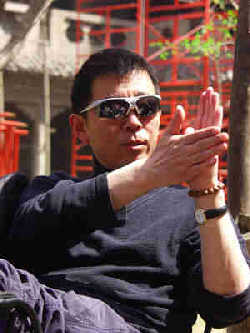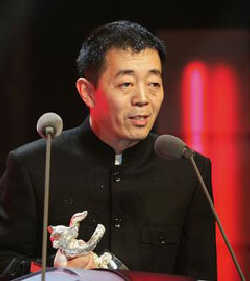 Gu Changwei
Gu Changwei
 Upon first impression, internationally renowned cinematographer Gu Changwei seems like a mild-mannered, reticent, and somewhat inarticulate man.
Upon first impression, internationally renowned cinematographer Gu Changwei seems like a mild-mannered, reticent, and somewhat inarticulate man.
And it's an impression he has little problem with: "Although I have made great improvement today, I was an awful stammerer when in middle school. Partly because of that, I do not like to talk too much."
But he has made up for that by expressing himself through the visual language of the motion picture. "I know well the tricks, fortunately," said Gu, 47.
Since the late 1980s, he has teamed up with film directors Zhang Yimou and Chen Kaige for such acclaimed films as Red Sorghum (Hong Gaoliang), King of the Children (Haizi Wang), Ju Dou, and Farewell My Concubine (Bawang Bieji).
Despite his confidence in the end product of Peacock, Gu admits that being a film director is more challenging than working as a cinematographer. He said that a cinematographer pays attention mainly to the film's visual quality, concentrating on obtaining the exact results he had in mind. By contrast, Gu said, a director must be responsible for the overall quality of the film and has to guide the combined efforts of the whole production crew towards the smooth, successful birth of a vividly told movie.
Peacock, Gu's directorial debut, has been awarded the Jury Grand Prix award at the Berlin Film Festival (Germany) this February (2005).
Gu admitted his desire to direct a self-written film, adding: "But I later realized writing in words is not my strong point."
The first time he read Li Qiang's script for Peacock, Gu said he was "totally absorbed" by the story and felt once again the strong desire of a young heart to escape the confinement of a closed, small, and somewhat boring place and to embrace the great world outside.
"I finished reading it in one sitting because it evokes bittersweet memories of my early years. I believe many Chinese share this kind of tender feeling with me," Gu said.
 Gu was born into a worker's family in Xi'an, capital of North China's Shaanxi Province in 1957. Interested in the arts at an early age, he took up painting while at school and excelled at it. After he graduated from senior middle school (equivalent to high school), he spent years working as an intern for a local movie theatre. He watched a lot of good films, and during that period of time developed a keen interest in the art of filmmaking.
Gu was born into a worker's family in Xi'an, capital of North China's Shaanxi Province in 1957. Interested in the arts at an early age, he took up painting while at school and excelled at it. After he graduated from senior middle school (equivalent to high school), he spent years working as an intern for a local movie theatre. He watched a lot of good films, and during that period of time developed a keen interest in the art of filmmaking.
In 1978, he enrolled in Beijing Film Academy and became a classmate of such ambitious and promising filmmakers as Zhang Yimou, Chen Kaige, Tian Zhuangzhuang, and Li Shaohong. In 1984, he began working for the Xi'an Film Studio as a cinematographer.
After years of experience as a photography director, and before Peacock, his work had garnered acclaim, winning him various international and domestic awards.
Gu contributed greatly to the huge success of Zhang Yimou's Red Sorghum in 1987, which is noted for its simple but impressive oil-painting scenes. With the huge success of Red Sorghum, he received the Best Cinematographer Prize of the 8th Golden Rooster Awards. In 1993, he was nominated for an Oscar Academy Award for his superb camerawork in Farewell My Concubine.
In 1994, he began working in Hollywood, and in 1995, he took the Best Cinematographer Award at the 15th Hawaii International Film Festival with Warrior Lanling.
As a cinematographer, Gu hopes to team with film directors who have very different ideas, approaches, and artistic styles, in order to "sharpen my skills and to gain more experience in this particular field." His shooting styles and technical approaches may change constantly when he deal with different film assignments and work with different film directors.
Now his time is divided between Beijing and Los Angeles (of the United States' state of California), shooting films for both Chinese and American directors.
